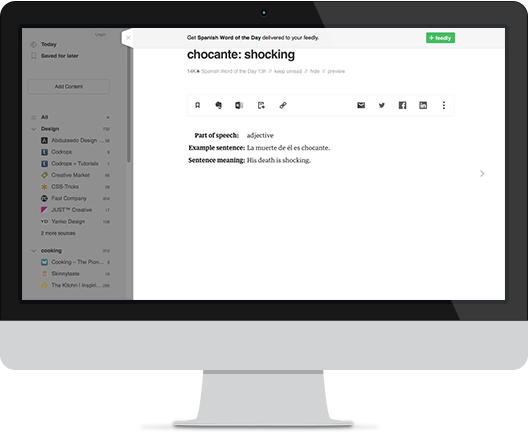
1. A.Word.A.Day (AWAD)
You can see the word of the day, and yesterday’s word of the day, on the website or through an email subscription. The website is strikingly simple, but highly useful. It provides the pronunciation, meaning, etymology, and usage of the selected word. Below the entry, the owner, Anu Garg, also presents a thought of the day. The New York Times commented that this website is “The most welcomed, most enduring piece of daily mass e-mail in cyberspace.” In fact, it has over a million subscribers from over 170 countries.
2. Merriam-Webster’s Word of the Day
One of the most respected dictionaries in the world, Merriam-Webster has a sophisticated layout for its word-of-the-day page. It provides a definition (with sound of the word spoken included), a “Did you know” section, examples of its usage, a “Name that synonym” section, podcasts, and a word of the day calendar at the bottom. Those who are truly interested in words and their histories, this dictionary will be a treat. Its “Did you know” section is expansive, and allows readers to understand the nuances of each selected word. On the left of the presentation is an easy way to share the word of the day through Facebook, Twitter, and Google Plus. You can even get the word of the day emailed to you through a subscription. It even has a section for learners called a learner’s dictionary. This dictionary also has a word-of-the-day category.
3. Wordnik
This website is all about words, with a word community, word of the day, and random word pages. On its word-of-the-day page, it has concise definitions of words with ample example sentences with the chosen word being used, extra notes on nuances, and also stats on its usage and even its Scrabble score. The fantastic thing about this page is that each word is accompanied with real examples from literature, not just sentences made up on the spot that sound unnatural. So, not only will you learn a new word each day, but also become knowledgeable in literature through this website. It also has an easy-to-access archive, and a convenient way of sharing words via social media.
4. Duolingo
This is perhaps the best language learning app and website out there. In turn, it is a great tool for learning new words. You can compete with your friends and family through the app, so you can gain that motivation needed to learn new words. It has a simple but pleasant layout, with many different exercises for learning: speaking, listening, writing, multiple choice questions, matching word exercises, and more. You can either strengthen what you already know, or venture into the world of new words each day. Duolingo focuses on obtaining a streak, so you know how many days in a row you have been learning a certain language (in our case, it is most likely English). There are many other language learning apps on the market, but it seems Duolingo takes the cake in terms of efficiency, user-friendliness, and motivation. It even has a cute owl mascot that cheers you on as you go through the exercises. I think that most people use the app rather than the website; however, both can be useful. It is important to download the necessary keyboards for the languages you are learning, though.
5. Dictionary.com’s Word of the Day
This is another popular option for learning new words easily. It shows the definitions in the form of a meme or picture you can conveniently share on social media (including showing the pronunciation and what kind of word it is). Below the definitions are citations of the word of the day’s usage from literature. Lastly, there is a section that discusses the origin of the word. You can sign up for an email subscription to the page, and seeing the visual archive of the word of the day for the previous day is just a scroll away.
6. Oxford Dictionary’s Word of the Day
Maybe the most trusted dictionary in the world, the Oxford Dictionary website also has a webpage that features a word of the day. For each entry, you have an audio pronunciation guide, a definition, the word’s origin, and an easy-to-share picture of the word with a pronunciation guide across social media. I like that the Oxford Dictionary focuses on archaic usages of words as well, as for wordaholics, these archaic definitions can be useful to know and interesting to understand. Like most sites of this nature, it also has an email subscription option. Another section of this website to check out if you have time is “Explore the English Language,” which has wordlists and word origin features.
7. New York Times’ Word of the Day
A standard in the news industry, it is also a fantastic tool for learning. The New York Times presents a word of the day daily, attached with a quiz. What is also useful is that it shows words in context of The New York Times itself. So, they will show how the word was used in news articles from the Times. Each entry has sections for definitions, examples of its usage in news articles, and a quiz at the bottom. After you finish the quiz, you will see a more detailed look into the chosen word, discussing its nuances. A great tool for learning more words, and more about them.
8. WordReference.com’s Word of the Day
The special thing about this website is that it offers two categories: basic word of the day, and intermediate word of the day. The basic word of the day is aimed at beginners and the intermediate word of the day is focused on people who have been learning English for some time. Though each category has entries that are filled with detail, there is a clear difference between basic and intermediate entries. In the basic section, entries have sections dedicated definitions, common uses, usage within pop culture, and a button that reads “see full definition,” which leads a user to an elaborated entry. For the intermediate entries, there are sections devoted to expanded definitions, example sentences, words most often used with the chosen entry, usage within pop culture, “did you know,” origins, and once again a “see full definition” button. This seems like the most comprehensive website for learning words and their background stories, so to say. You can get these definitions sent to you by email, and can also share them easily via Facebook and Twitter. You can scroll through entries as if you were on a common blogging site.
9. Vocabulary.com
This website tries its best to make learning new words enjoyable. It has word games to play, you can look up words, and it has word lists. They say if you start playing with language, you will learn it quickly. This website seems to take this approach. When learning is fun and flexible, words will be retained at a better rate. A great thing about its quizzes is that when you answer a question, it will describe the word in detail. The search option has examples sentences written by humans, not computers (it happens often it seems), examples sentences that are in touch with the real world of how English is being used, and claims to be the fastest-working dictionary. Its layout is user-friendly and intuitive. In the lists section, there are myriad lists focused on different subjects, ranging from baseball to movies. It is a highly enjoyable and engaging website for learning new words, and for studying English in general.
10. Word of the Day! App
For people who are crazy about checking other dictionaries for varying definitions, this is the app for them. This app features the following sources:
- Merriam-Webster
- Dictionary.com
- Oxford English Dictionary
- The Free Dictionary
- The Learning Network
- WordSpy
- Latin Word of the Day
- MedTerms
- Yahoo! Education
You can conveniently compare definitions, and discover the nuances of words you want to delve into. In addition, you can “star” and “favorite” certain definitions and words. These starred and favorited words can be shared with friends, and the app will also alert you when new words have been entered into its system. It’s a free app, so it is a catch for those who don’t want to spend to learn. The entries for the words have audio recordings of pronunciation, root meanings, examples sentences, and connotations of chosen words.
In terms of vocabulary development, we were all little geniuses in childhood, learning hundreds of new words every year. By the time we entered first grade, most of us had active vocabularies of several thousand words.
Unfortunately, we weren’t geniuses for very long. By age 11 or 12, equipped with a sizable survival vocabulary, most of us lost some of our early enthusiasm for language, and the rate at which we picked up new words began to decline significantly. As adults, if we don’t make deliberate efforts to increase our vocabularies, we’re lucky to pick up even 50 or 60 new words a year.
The English language has so much to offer (between 500,000 and 1 million words, by most accounts) that it would be a shame to let our vocabulary-building talents go to waste. So here’s one way that we can regain some of our youthful brilliance: learn a new word each day.
Whether you’re a student preparing for the SAT, ACT, or GRE, or simply an unabashed logophile (or lover of words), starting each day with a fresh word can be intellectually nourishing—and more enjoyable than a bowl of All-Bran.
Here are three of our favorite daily word sites: all are free and available through e-mail subscriptions.
A.Word.A.Day (AWAD)
Founded in 1994, A.Word.A.Day at Wordsmith.org is the creation of Anu Garg, an India-born computer engineer who clearly enjoys sharing his pleasure in words. Simply designed, this popular site (nearly 400,000 subscribers from 170 countries) offers concise definitions and examples of words that relate to a different theme every week. The New York Times has called this «the most welcomed, most enduring piece of daily mass e-mail in cyberspace.» Recommended for all word lovers.
Oxford English Dictionary Word of the Day
For many of us, the Oxford English Dictionary is the ultimate reference work, and the OED Word of the Day provides a complete entry (including a wealth of illustrative sentences) from the 20-volume dictionary. You can sign up to have the OED’s Word of the Day delivered by e-mail or RSS web feed. Recommended for scholars, English majors, and logophiles.
Merriam-Webster’s Word of the Day
Less expansive than the OED site, the daily word page hosted by this U.S. dictionary-maker offers an audio pronunciation guide along with basic definitions and etymologies. The Merriam-Webster Word of the Day is also available as a podcast, which you can listen to on your computer or MP3 player. Recommended for high school and college students as well as advanced ESL students.
Other Daily Word Sites
These sites should also be useful to high school and college students.
- Dictionary.com Word of the Day
- The Learning Network (The New York Times)
- The Quotations Page Word of the Day
Of course, you don’t have to go online to learn new words. You can simply begin making a list of new words that you encounter in your reading and conversations. Then look up each word in a dictionary and write down the definition along with a sentence that illustrates how the word is used.
But if you need a little encouragement to work on building your vocabulary every day, sign up for one of our favorite word-a-day sites.
April 14, 2023
lacking life, spirit, or zest
April 13, 2023
to make or repair something with materials conveniently on hand
April 12, 2023
the area around or near a place
April 11, 2023
like an oracle in solemnity, or in having wise or divine insight
April 10, 2023
a minor flaw or shortcoming
April 09, 2023
showing or suggesting that future success is likely
April 08, 2023
to limit the size or amount of something
April 07, 2023
ambiguous or difficult to understand
April 06, 2023
a ceremonial dinner held on Passover
April 05, 2023
to divide into political units giving one group unfair advantage
Learn a new word every day. Delivered to your inbox!
April 2023
-
Apr 01
shenanigans
-
Apr 02
démarche
-
Apr 03
infantilize
-
Apr 04
belated
-
Apr 05
gerrymander
-
Apr 06
seder
-
Apr 07
equivocal
-
Apr 08
circumscribe
-
Apr 09
auspicious
-
Apr 10
foible
-
Apr 11
oracular
-
Apr 12
vicinity
-
Apr 13
MacGyver
-
Apr 14
lackadaisical
March 2023
-
Mar 01
fresco
-
Mar 02
contretemps
-
Mar 03
accentuate
-
Mar 04
proximate
-
Mar 05
repartee
-
Mar 06
vindicate
-
Mar 07
laudable
-
Mar 08
cahoots
-
Mar 09
ingratiate
-
Mar 10
factotum
-
Mar 11
scrupulous
-
Mar 12
divulge
-
Mar 13
apotheosis
-
Mar 14
gallivant
-
Mar 15
nadir
-
Mar 16
heterodox
-
Mar 17
Erin go bragh
-
Mar 18
lacuna
-
Mar 19
tactile
-
Mar 20
kith
-
Mar 21
fawn
-
Mar 22
obdurate
-
Mar 23
symbiosis
-
Mar 24
zany
-
Mar 25
eighty-six
-
Mar 26
cavalcade
-
Mar 27
disparate
-
Mar 28
bildungsroman
-
Mar 29
immaculate
-
Mar 30
golem
-
Mar 31
recuse
February 2023
-
Feb 01
eleemosynary
-
Feb 02
portend
-
Feb 03
challah
-
Feb 04
scrutinize
-
Feb 05
weal
-
Feb 06
fraught
-
Feb 07
acquiesce
-
Feb 08
despot
-
Feb 09
vapid
-
Feb 10
ignis fatuus
-
Feb 11
besotted
-
Feb 12
gambit
-
Feb 13
magniloquent
-
Feb 14
coquetry
-
Feb 15
divest
-
Feb 16
lyrical
-
Feb 17
anachronism
-
Feb 18
impromptu
-
Feb 19
cleave
-
Feb 20
prerogative
-
Feb 21
onerous
-
Feb 22
rectify
-
Feb 23
tantamount
-
Feb 24
hiatus
-
Feb 25
nurture
-
Feb 26
foray
-
Feb 27
ersatz
-
Feb 28
stultify
January 2023
-
Jan 01
annus mirabilis
-
Jan 02
precocious
-
Jan 03
delegate
-
Jan 04
genius
-
Jan 05
fortuitous
-
Jan 06
garner
-
Jan 07
conundrum
-
Jan 08
ascetic
-
Jan 09
charlatan
-
Jan 10
teleological
-
Jan 11
bombast
-
Jan 12
luscious
-
Jan 13
countenance
-
Jan 14
recondite
-
Jan 15
névé
-
Jan 16
paladin
-
Jan 17
hoodwink
-
Jan 18
implacable
-
Jan 19
misanthrope
-
Jan 20
vulpine
-
Jan 21
exacerbate
-
Jan 22
short shrift
-
Jan 23
endemic
-
Jan 24
balkanize
-
Jan 25
marginalia
-
Jan 26
knackered
-
Jan 27
wangle
-
Jan 28
doctrinaire
-
Jan 29
rubric
-
Jan 30
adapt
-
Jan 31
savant
December 2022
-
Dec 01
sandbag
-
Dec 02
gloaming
-
Dec 03
perceptible
-
Dec 04
celerity
-
Dec 05
abdicate
-
Dec 06
solace
-
Dec 07
lachrymose
-
Dec 08
vandalize
-
Dec 09
expeditious
-
Dec 10
bravado
-
Dec 11
imbue
-
Dec 12
compadre
-
Dec 13
fiduciary
-
Dec 14
undulate
-
Dec 15
morass
-
Dec 16
putative
-
Dec 17
oblivion
-
Dec 18
ineluctable
-
Dec 19
dreidel
-
Dec 20
gainsay
-
Dec 21
accoutrement
-
Dec 22
deleterious
-
Dec 23
speculate
-
Dec 24
tortuous
-
Dec 25
nativity
-
Dec 26
halcyon
-
Dec 27
cajole
-
Dec 28
lodestar
-
Dec 29
espouse
-
Dec 30
boondoggle
-
Dec 31
retrospective
November 2022
-
Nov 01
sallow
-
Nov 02
fustigate
-
Nov 03
rapscallion
-
Nov 04
catercorner
-
Nov 05
abandon
-
Nov 06
gauche
-
Nov 07
serendipity
-
Nov 08
encapsulate
-
Nov 09
bilious
-
Nov 10
lapidary
-
Nov 11
doughty
-
Nov 12
intoxicate
-
Nov 13
crucible
-
Nov 14
magnanimous
-
Nov 15
augur
-
Nov 16
hummock
-
Nov 17
nugatory
-
Nov 18
farce
-
Nov 19
pell-mell
-
Nov 20
extirpate
-
Nov 21
temerity
-
Nov 22
leonine
-
Nov 23
vamoose
-
Nov 24
cornucopia
-
Nov 25
jejune
-
Nov 26
sustain
-
Nov 27
onomatopoeia
-
Nov 28
wheedle
-
Nov 29
motley
-
Nov 30
quiddity
October 2022
-
Oct 01
critique
-
Oct 02
emblazon
-
Oct 03
languid
-
Oct 04
onus
-
Oct 05
atone
-
Oct 06
gargantuan
-
Oct 07
proffer
-
Oct 08
spiel
-
Oct 09
avuncular
-
Oct 10
bombinate
-
Oct 11
mnemonic
-
Oct 12
rabble
-
Oct 13
decorous
-
Oct 14
transmogrify
-
Oct 15
cadence
-
Oct 16
frenetic
-
Oct 17
hyperbole
-
Oct 18
bespoke
-
Oct 19
writhe
-
Oct 20
interlocutor
-
Oct 21
cloying
-
Oct 22
abide
-
Oct 23
volition
-
Oct 24
genteel
-
Oct 25
sepulchre
-
Oct 26
peculiar
-
Oct 27
defile
-
Oct 28
utopia
-
Oct 29
notorious
-
Oct 30
scour
-
Oct 31
lycanthropy
September 2022
-
Sep 01
umbrage
-
Sep 02
grandiose
-
Sep 03
adjure
-
Sep 04
demeanor
-
Sep 05
assiduous
-
Sep 06
panache
-
Sep 07
conciliate
-
Sep 08
mawkish
-
Sep 09
facsimile
-
Sep 10
obliterate
-
Sep 11
substantive
-
Sep 12
invective
-
Sep 13
titivate
-
Sep 14
broadside
-
Sep 15
rancid
-
Sep 16
coalesce
-
Sep 17
laconic
-
Sep 18
exponent
-
Sep 19
haywire
-
Sep 20
verdigris
-
Sep 21
perspicacious
-
Sep 22
defer
-
Sep 23
misnomer
-
Sep 24
anthropomorphic
-
Sep 25
caucus
-
Sep 26
sporadic
-
Sep 27
fructify
-
Sep 28
kerfuffle
-
Sep 29
ritzy
-
Sep 30
proselytize
August 2022
-
Aug 01
frolic
-
Aug 02
nebulous
-
Aug 03
patina
-
Aug 04
brackish
-
Aug 05
heartstring
-
Aug 06
adjudicate
-
Aug 07
eminently
-
Aug 08
crepuscular
-
Aug 09
riposte
-
Aug 10
trivial
-
Aug 11
alleviate
-
Aug 12
melancholia
-
Aug 13
carceral
-
Aug 14
shard
-
Aug 15
dilatory
-
Aug 16
litany
-
Aug 17
wreak
-
Aug 18
immutable
-
Aug 19
charisma
-
Aug 20
unabashed
-
Aug 21
epitome
-
Aug 22
rash
-
Aug 23
abrogate
-
Aug 24
glitch
-
Aug 25
overwhelm
-
Aug 26
vociferous
-
Aug 27
sensibility
-
Aug 28
devolve
-
Aug 29
jaunty
-
Aug 30
effulgence
-
Aug 31
brandish
July 2022
-
Jul 01
debunk
-
Jul 02
apposite
-
Jul 03
teem
-
Jul 04
Yankee
-
Jul 05
cantankerous
-
Jul 06
recidivism
-
Jul 07
inscrutable
-
Jul 08
postulate
-
Jul 09
behemoth
-
Jul 10
gibbous
-
Jul 11
carp
-
Jul 12
eccentric
-
Jul 13
saga
-
Jul 14
validate
-
Jul 15
akimbo
-
Jul 16
nuance
-
Jul 17
finicky
-
Jul 18
sanction
-
Jul 19
emolument
-
Jul 20
waggish
-
Jul 21
iconoclast
-
Jul 22
muse
-
Jul 23
conscientious
-
Jul 24
pathos
-
Jul 25
extradite
-
Jul 26
Luddite
-
Jul 27
apropos
-
Jul 28
ostentatious
-
Jul 29
brouhaha
-
Jul 30
ineffable
-
Jul 31
menagerie
June 2022
-
Jun 01
behest
-
Jun 02
meld
-
Jun 03
perfunctory
-
Jun 04
decry
-
Jun 05
fidelity
-
Jun 06
sumptuous
-
Jun 07
vocation
-
Jun 08
arrogate
-
Jun 09
evanescent
-
Jun 10
lout
-
Jun 11
headlong
-
Jun 12
burgle
-
Jun 13
panacea
-
Jun 14
festoon
-
Jun 15
credulous
-
Jun 16
adulation
-
Jun 17
oblige
-
Jun 18
redolent
-
Jun 19
emancipation
-
Jun 20
garrulous
-
Jun 21
prescience
-
Jun 22
quibble
-
Jun 23
ingenuous
-
Jun 24
confidant
-
Jun 25
noisome
-
Jun 26
culminate
-
Jun 27
jingoism
-
Jun 28
fulsome
-
Jun 29
duress
-
Jun 30
scintillate
May 2022
-
May 01
leviathan
-
May 02
piggyback
-
May 03
schmooze
-
May 04
abeyance
-
May 05
fractious
-
May 06
mollify
-
May 07
sagacious
-
May 08
darling
-
May 09
orientate
-
May 10
conclave
-
May 11
ramshackle
-
May 12
bloviate
-
May 13
turpitude
-
May 14
verdant
-
May 15
hark back
-
May 16
epithet
-
May 17
nonpareil
-
May 18
indoctrinate
-
May 19
kibosh
-
May 20
ad hoc
-
May 21
paradox
-
May 22
galumph
-
May 23
mercurial
-
May 24
dander
-
May 25
benevolent
-
May 26
fetter
-
May 27
uncanny
-
May 28
propagate
-
May 29
junket
-
May 30
commemorate
-
May 31
ephemeral
April 2022
-
Apr 01
predilection
-
Apr 02
convoluted
-
Apr 03
exculpate
-
Apr 04
salient
-
Apr 05
adversity
-
Apr 06
grift
-
Apr 07
druthers
-
Apr 08
mettlesome
-
Apr 09
construe
-
Apr 10
liaison
-
Apr 11
zoomorphic
-
Apr 12
funambulism
-
Apr 13
bemuse
-
Apr 14
opportune
-
Apr 15
vanguard
-
Apr 16
timeless
-
Apr 17
resurrection
-
Apr 18
elicit
-
Apr 19
polyglot
-
Apr 20
imprimatur
-
Apr 21
juxtapose
-
Apr 22
simulacrum
-
Apr 23
askance
-
Apr 24
deem
-
Apr 25
hoary
-
Apr 26
minion
-
Apr 27
cerebral
-
Apr 28
salt junk
-
Apr 29
flummox
-
Apr 30
nefarious
Love It or Hate It
-
- When asked about her blind date, Carol spoke for hours with vitriol.
You know what it looks like… but what is it called?
TAKE THE QUIZ
Can you make 12 words with 7 letters?
PLAY
Learn a new word every day. Delivered to your inbox!
At Woodward English on Twitter we have an “English Word of the Day” to help you improve your vocabulary with a new word every day from Monday to Sunday. We also include an example of that new word in a sentence so you can see it in context.
How can you use the English word of the day to help you learn?
The most important thing about learning vocabulary is to USE the new word.
It is best to learn words in context or associated with something and not just reading long lists of words (which is boring and doesn’t help you very much). That is why we have created 7 Tips to help you learn the new word of the day.
7 Tips for learning an English Word a day
1. Use the new word in a sentence
After you have read the word and understood its meaning, use that new word in your own sentence. It is best to try and create a sentence that has some type of relationship or connection with your life.
2. Look for grammatical variations of the word
Look for the different ways (grammatical forms) the word can appear. For example if the word to suspect (a verb) is given to you, you can look for its noun form (suspicion), its adjective form (suspicious) etc. Suspect can also be a noun (a suspect). Remember that not all words have all grammatical forms. It pays to have a good English dictionary to help you with this.
Once you have the different forms of the new word, you can then try and make a sentence with each one.
3. Do Word Associations
Try and associate the word with other things (like a mind map). Not only will it help you remember the new word but it will also increase your knowledge (vocabulary) of other things associated with the word.
For example if you have the new word CAR (a noun),
Think of nouns associated with the word (parts of a car: windscreen, steering wheel…)
Think of verbs associated with the word (to Brake, to accelerate, to crash…)
Think of adjectives to describe it (Fast, rusty… )
Think of examples of the word (Limousine, Jeep…)
If the word is an adjective for example BIG
Think of synonyms or words with a similar meaning (large, enormous, huge…)
Think of antonyms or opposites (small, tiny…)
Think of examples of the adjective (Big: Elephant, a continent, Jupiter…)
4. Carry a list or a notepad with you
Write the new word and its meaning (and maybe an example too) in a small notepad that you can carry with you and read whenever you have a spare moment (or some people keep them in their smartphone). This can be read while you are sitting on a bus, on the underground/subway, or while you are in a waiting room. This will help you see the words more than once and will help them stick in your mind.
5. Make flash cards
Make little cards with each new word on one side and the meaning of that word on the other side. Put them on the ground and if the meaning is face up, then try and think of the word. If the word appears face up, then think of its meaning. When you start to have a lot of cards you can shuffle them and randomly pick out 10 or so every day.
6. Look for examples on the internet
Type the word in a search engine (such as Google) and write down 7 different sentences that contain an example of that word. This way you will see the word in context and maybe other vocabulary associated with it. For better results, look for one sentence every day over 7 different days.
7. Learn the word again on other days
Don’t just learn or practice a word one day and then forget about it. You may think you have learned the word (since you have just been using it) but if you try to remember/use the new word a couple of weeks later, you may find it difficult. To really remember a word you need to reuse that word over and over before it sticks in your long-term memory.
There is a saying in English “Use it or lose it.” Basically this means if you don’t use (or practice) something you have learned, you will eventually forget how to use it properly.
I hope these tips have helped. See you at our English Word of the Day on Twitter.
How can I learn new words daily?
- RSS
Get it in your inbox.
Fill out your email address to get Word of the Day in your email every day. Each language you sign up for will appear in your daily email.

Subscribe to Word of the Day
Join our Facebook community.
Get Word of the Day in your Facebook feed, along with blog updates, language-related news, and more. Our communities invite both experts and learners to join in discussion.
Choose your language:
Afrikaans,
Arabic,
Chinese,
Danish,
Dari,
Dutch,
English,
Esperanto,
French,
German,
Greek,
Haitian Creole,
Hebrew,
Hindi,
Icelandic,
Inglês,
Irish,
Italian,
Japanese,
Korean,
Latin,
Norwegian,
Pashto,
Polish,
Brazilian Portuguese,
Russian,
Spanish,
Swedish,
Thai,
Turkish,
Urdu,
Zulu


Follow a language on Twitter.
Receive daily tweets of the Word of the Day. Follow any language of your choice and it will arrive in your Twitter stream.
Choose your language:
Afrikaans,
Arabic,
Chinese,
Danish,
Dari,
Dutch,
English,
Esperanto,
Farsi,
French,
German,
Greek,
Hebrew,
Hindi,
Icelandic,
Inglês,
Irish,
Italian,
Japanese,
Korean,
Latin,
Norwegian,
Pashto,
Polish,
Brazilian Portuguese,
Russian,
Spanish,
Swedish,
Thai,
Urdu,
Zulu
Subscribe to RSS.
Choose from any of the languages in the dropdown above and click the RSS link. (What’s RSS?)
Choose your language:
Arabic,
Chinese,
Dari,
Dutch,
English for Portuguese Speakers,
English for Spanish Speakers,
Esperanto,
French,
German,
Hebrew,
Hindi,
Indonesian,
Irish,
Italian,
Japanese,
Korean,
Latin,
Norwegian,
Pashto,
Polish,
Portuguese,
Russian,
Spanish,
Swedish,
Turkish,
Urdu





